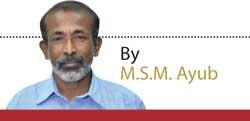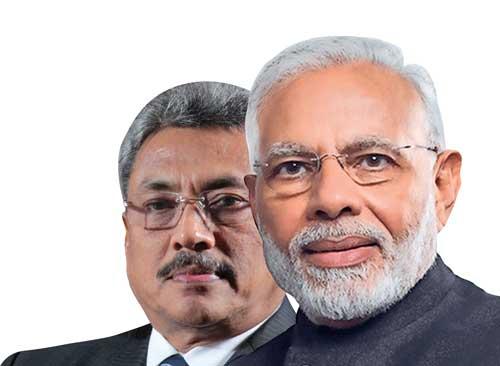02 Jan 2021 - {{hitsCtrl.values.hits}}
 The Sri Lanka Podujana Peramuna (SLPP) leaders, before they came to power had been criticizing the former “Yahapalana” government for the postponement of the Provincial Council elections. They had been accusing the United National Party (UNP) for amending the Provincial Council Election Act in 2017 in an unethical manner, providing for a mixed electoral system. They also criticised the UNP-led government for creating a situation under which the PC elections faced a deadlock.
The Sri Lanka Podujana Peramuna (SLPP) leaders, before they came to power had been criticizing the former “Yahapalana” government for the postponement of the Provincial Council elections. They had been accusing the United National Party (UNP) for amending the Provincial Council Election Act in 2017 in an unethical manner, providing for a mixed electoral system. They also criticised the UNP-led government for creating a situation under which the PC elections faced a deadlock.
Ironically the government led by the same SLPP has now decided to postpone the provincial council elections indefinitely, with a section of the party calling for the abolition of the provincial council system. Environment Minister Mahinda Amaraweera had told media on Tuesday that the party leaders had decided to postpone the provincial council elections considering the COVID-19 situation in the country and the request of the Maha Sangha.
Meanwhile, responding to a question by the media on the request to abolish the provincial council system, State Minister Dayasiri Jayasekara said on Wednesday that the government would have to discuss with the Indian government before taking a decision on scrapping the system, as it was a result of the Indo-Sri Lanka Accord of 1987.
Ironically the government led by the same SLPP has now decided to postpone the provincial council elections indefinitely, with a section of the party calling for the abolition of the provincial council system

On the same day, The Hindu published an interview, mainly on this subject, with former president Maithripala Sirisena, leader of Jayasekera’s party, the Sri Lanka Freedom Party (SLFP). The former president said, “abolishing provincial councils is like playing with fire,” while pointing out “India could get a little upset with us if we completely do away with the 13th Amendment” under which the provincial councils were established.
However, it is a fact that the Sinhalese nationalistic opposition to the provincial councils has been gaining momentum following the assumption of office by President Gotabaya Rajapaksa in November 2019. It was he who launched the first salvo this time against the concept of devolution of power in general and the provincial council system in particular, during his first visit abroad to India, ten days after he was elevated to the highest post in the country.
He told in the interview with Suhasini Haider of “The Hindu” and the daughter of Subramanian Swamy, “We can discuss political issues, but for 70 odd years, successive leaders have promised one single thing: Devolution, devolution, devolution. But ultimately nothing happened. I also believe that you cannot do anything against the wishes and feelings of the majority community. Anyone who is promising something against the majority’s will is untrue. No Sinhalese will say, do not develop the area, or do not give jobs, but political issues are different.”
President Gotabaya subsequently appointed Sarath Weerasekara, a staunch adversary of the PC system as the State Minister in charge of PCs. This reminded us of the appointment of Mervyn Silva who had been accused of attacking journalists and media houses as State Minister for Media by President Mahinda Rajapaksa. Weerasekara too continued the campaign against the PC system.
However, it is difficult to believe that a majority of the SLPP leaders want to scrap the system as they want to have a system parallel to Parliament to get their offspring trained as politicians before they enter national politics while living a luxury life with powers and perks.
In fact, the provincial council system has not satisfied the political aspirations of the Tamil leaders as expected nor has it led to the division of the country as claimed by the Sinhalese nationalistic forces. Neither have the Tamil politicians used the system for the betterment of the people they claim to represent, at least to the extent it permits. They used it for political purposes rather than for minimizing the sufferings of the northern people who were the people hit hardest by the three-decade long war.
The notion that the provincial councils eat up a huge amount of public funds and that could be prevented by abolishing the system is either a miscalculation of facts or a diabolical lie based on sheer racism or blind opposition to the system. The administrative structures under the provincial councils are a part of the national administrative structure. For instance, the schools, roads and hospitals currently maintained under the provincial councils would continue to be maintained even if the PC system is scrapped. They would just be handed over to the national administrative bodies such as ministries and departments of the Central Government.
The only advantage that the country would gain financially in a situation without the provincial councils is that the government would be save the funds that are currently spent on salaries and the perks provided for the elected members of those councils including the Chief Ministers and ministers and the huge amount of money spent on elections for those councils once in four years. Nevertheless, those funds could be off set if these councils could plan and implement provincial level development schemes, without being puppets of the central government or the ruling parties of those councils.
Needless to say, the India factor is extremely important in making any decision on the fate of the provincial councils. Yet, it is not clear as to what extent the northern neighbour is attaching significance to the existence of those councils in Sri Lanka. In 2017 Indian External Affairs Minister Dr. S. Jaishanker openly said that India would no longer press for the merger of Northern and Eastern Provinces of Sri Lanka, an important provision of the Indo-Lanka Accord. Similarly, hot on the heels of Indian Prime Minister Narendra Modi and External Affairs Minister Jaishanker having stressed the concepts of devolution of power and provincial councils, the most important provision of that Accord, during discussions with President Gotabaya Rajapaksa in November 2019, the latter had rejected it during subsequent media interviews. Yet, Indian leaders did not respond adversely. However, if the government believes that India would be a passive observer in this regard, it might be a blunder on its part, as there is every possibility of India using such issues as a cudgel against Sri Lanka, as happened in 1980s, in light of the latter’s ever strengthening relationship with China.
Apparently, sensing this danger subsequent to his brother’s visit to India, Prime Minister Mahinda Rajapaksa, in a damage controlling tone told The Hindu in February last year something diametrically different from what the former told the same paper a month ago. The Premier went on to say that the government was going to strengthen the PC system. He had further stated, “We want to go forward, but we need to have someone to discuss, who can take responsibility for the [Tamil] areas. So the best thing is to hold elections, and then ask for their representatives to come and discuss the future with us.” Hence it could be surmised that the status quo would remain at the end of the day, after enthralling a section of the vote bank of the SLPP for a while.
30 Nov 2024 2 hours ago
30 Nov 2024 3 hours ago
29 Nov 2024 29 Nov 2024
29 Nov 2024 29 Nov 2024
29 Nov 2024 29 Nov 2024